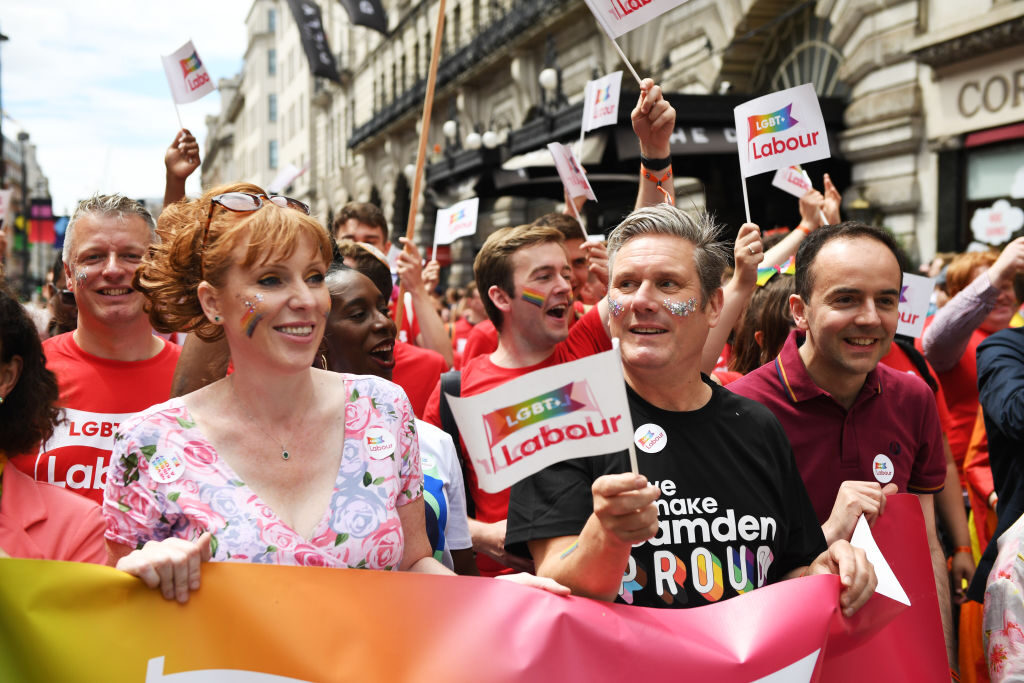There’s a particular pattern which will be familiar to anyone who’s spent a few years in the trenches of the so-called “terf wars”. From the moment you take your first tentative step into battle — apologetically coming out in support of female-only rape crisis centers, or nervously venturing that you don’t actually like being called a “menstruator” — you will find that the problem is not just that trans extremists consider such positions actual violence.
Plenty of people don’t, but that doesn’t mean they will support you — at least not yet. These “reasonable” people will tell you they’d be happy to at some point, but right now it’s too toxic. They’d like to leave it a few years, if that’s okay with you. Once it’s safe for them to repeat the things you were saying back in 2016, they’ll be straight onto it.
This has essentially been Labour’s approach to the sex and gender debate of the past 15 years. The Government’s announcement at the weekend that it will be considering an overhaul of equality laws, in order to resolve some points of contention regarding sex and gender, might at surface level look promising. Yet it glosses over a history during which Labour politicians have actively ignored the abuse of gender-critical feminists and stubbornly insisted that women can have penises. Meanwhile, the more “voice of reason” types — such as Prime Minister Keir Starmer — have fretted over both sides “throwing bricks at each other”, while promising to bring “more light, less heat” to the discussion.
In practice, this has meant that they will take on board the arguments of feminist groups only after these women have taken all the hits, and clarify laws only after ordinary women have crowdfunded legal cases to show there was a problem to begin with. There’s an argument which says if we get there in the end, that’s the main thing. Even if you’re remembered as a bigot for speaking up first, isn’t it worth it if women-only spaces are protected?
This is true, up to a point. Indeed, this is likely how women’s rights groups may be expected to respond to the Government’s new announcement. The Equality and Human Rights Commission has submitted a revised version of its Statutory Code of Practice on Services, Public Functions and Associations. Recommendations include compelling organizations to define the difference between sex and gender, and requiring trans people to present Gender Recognition Certificates when seeking access to single-sex spaces. This is, we are encouraged to believe, a move towards protecting women’s rights.
Yet it is hard to feel too celebratory. If all this had been proposed 10 years ago, when Stonewall was poised to start misleading employers by insisting on the primacy of gender identity over biological sex, it could have nipped many issues in the bud. Now, however, things appear less sure.
The trouble with a “wait until it’s safe to say it” approach is that the world moves on while you’re sitting it out. Just a decade or so ago, it might have been possible to think that trans women were a tiny minority with a very serious, mysterious condition called “gender dysphoria”, and that there would be no real impact on the definition of “woman” from indulging a legal fiction. It is not possible to think this now.
The failure of politicians and rights organizations to engage with what women were saying, and act accordingly, has allowed a culture of male entitlement to women’s spaces to flourish. Women’s rights can only be clawed back now by being absolutely clear that sex, not gender, matters at all times. It is not enough to “differentiate” if we still insist that both things can signify “woman” all the same.
Women cannot count on behind-the-curve politicians for this. It’s still grassroots women’s organizations, such as For Women Scotland in its current case against the Scottish Government, which are focusing on the here and now. It’s better than nothing, but Labor has a lot of catching up to do.











Join the discussion
Join like minded readers that support our journalism by becoming a paid subscriber
To join the discussion in the comments, become a paid subscriber.
Join like minded readers that support our journalism, read unlimited articles and enjoy other subscriber-only benefits.
Subscribe